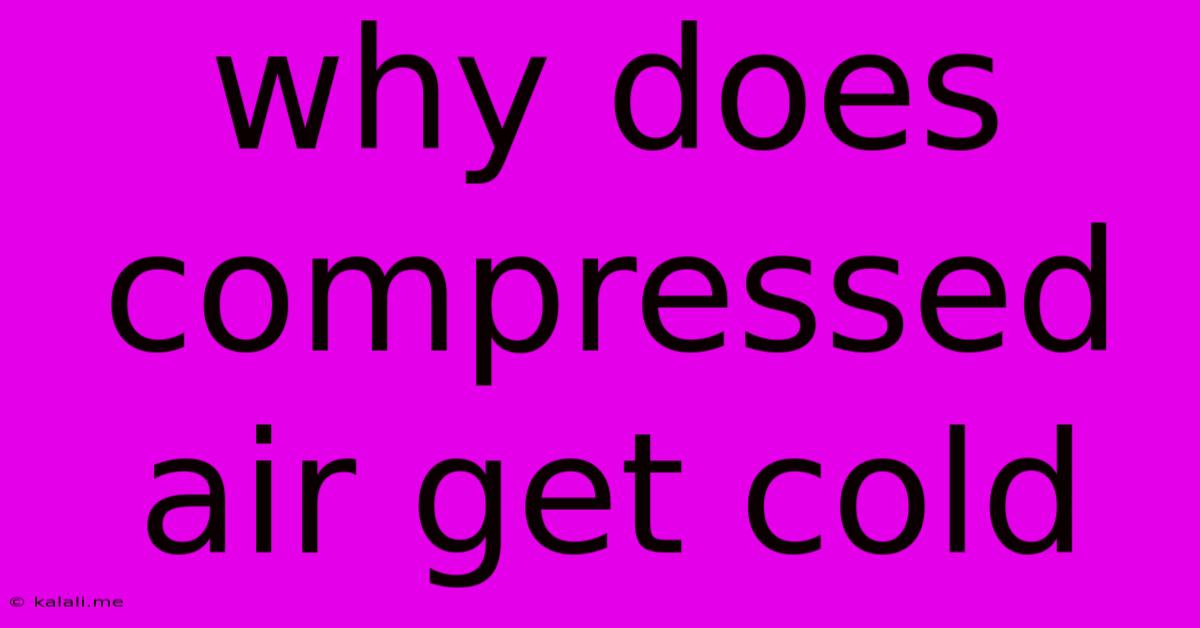Why Does Compressed Air Get Cold
Kalali
Jun 02, 2025 · 3 min read

Table of Contents
Why Does Compressed Air Get Cold? The Science Behind the Chill
Have you ever noticed how a compressed air canister or the nozzle of an air compressor feels cold to the touch? This isn't some magical phenomenon; it's a direct result of the principles of thermodynamics, specifically relating to the adiabatic expansion of gases. This article will explain the science behind this cooling effect, exploring the relationship between pressure, volume, and temperature in compressed air. Understanding this process is crucial for anyone working with compressed air systems, from industrial applications to everyday tools.
The Joule-Thomson Effect: The Key Player
The primary reason compressed air gets cold is due to the Joule-Thomson effect. This effect describes the temperature change of a real gas or liquid when it's forced through a valve or porous plug while keeping the enthalpy (total heat content) constant. In simpler terms, when compressed air is released, it expands rapidly. This expansion causes a decrease in the air's internal energy, manifesting as a drop in temperature.
Think of it like this: the compressed air molecules are initially packed tightly together, possessing high kinetic energy (energy of motion). When the pressure is released, these molecules suddenly have more space to move around. This increased volume leads to a decrease in the average kinetic energy of the molecules, resulting in a lower temperature. It's important to note that this isn't just about the air molecules losing energy; the process is primarily about a change in the average kinetic energy.
Adiabatic Expansion: No Heat Exchange
The expansion of compressed air during release is considered adiabatic, meaning there's little to no heat exchange with the surrounding environment. This contrasts with isothermal expansion, where the temperature remains constant. Because the expansion is so rapid, there isn't enough time for significant heat transfer to occur. This adiabatic nature contributes significantly to the cooling effect. The air cools because the work done in expanding against atmospheric pressure is done at the expense of its internal energy, leading to a temperature decrease.
Factors Affecting the Cooling Effect
Several factors can influence the extent of the cooling effect:
- Initial Pressure: Higher initial pressure leads to a more significant temperature drop upon expansion. The higher the initial energy stored within the compressed air, the more energy is converted into work during expansion, resulting in a greater temperature decrease.
- Type of Gas: Different gases exhibit varying degrees of cooling due to their unique molecular properties and intermolecular forces.
- Rate of Expansion: A faster expansion rate minimizes heat transfer, resulting in a more pronounced cooling effect.
- Ambient Temperature: The surrounding temperature affects the final temperature of the expanded air.
Practical Implications and Applications
The cooling effect of compressed air has several practical implications:
- Air compressor maintenance: Understanding this phenomenon helps in designing efficient and safe air compressor systems.
- Industrial applications: The cooling effect can be harnessed in certain industrial processes requiring rapid cooling.
- Safety precautions: Being aware of the potential for cold temperatures is crucial for preventing frostbite or other related injuries when handling compressed air.
In conclusion, the cold air you feel emanating from a compressed air source isn't a trick of the eyes or ears; it's a direct consequence of the Joule-Thomson effect and adiabatic expansion. Understanding this fundamental thermodynamic principle provides valuable insight into the behavior of compressed air and its various applications. This knowledge is essential for safe and efficient handling of compressed air systems in any setting.
Latest Posts
Latest Posts
-
How Do You Call Ingredient Badges
Jun 04, 2025
-
How Long Does It Take For Deck Stain To Dry
Jun 04, 2025
-
Steel Vs Silver Sword Withcer 3
Jun 04, 2025
-
Where Do Screen Recordings Go On Mac
Jun 04, 2025
-
Maskman Stage Show At 5 Heroes Korakuen Yuenchi
Jun 04, 2025
Related Post
Thank you for visiting our website which covers about Why Does Compressed Air Get Cold . We hope the information provided has been useful to you. Feel free to contact us if you have any questions or need further assistance. See you next time and don't miss to bookmark.